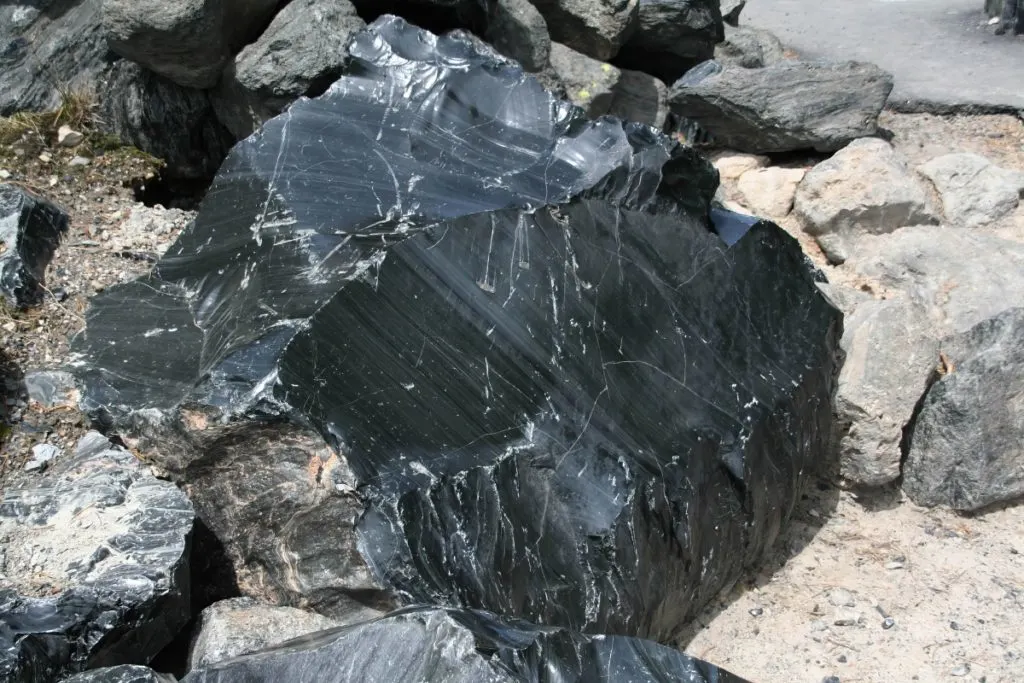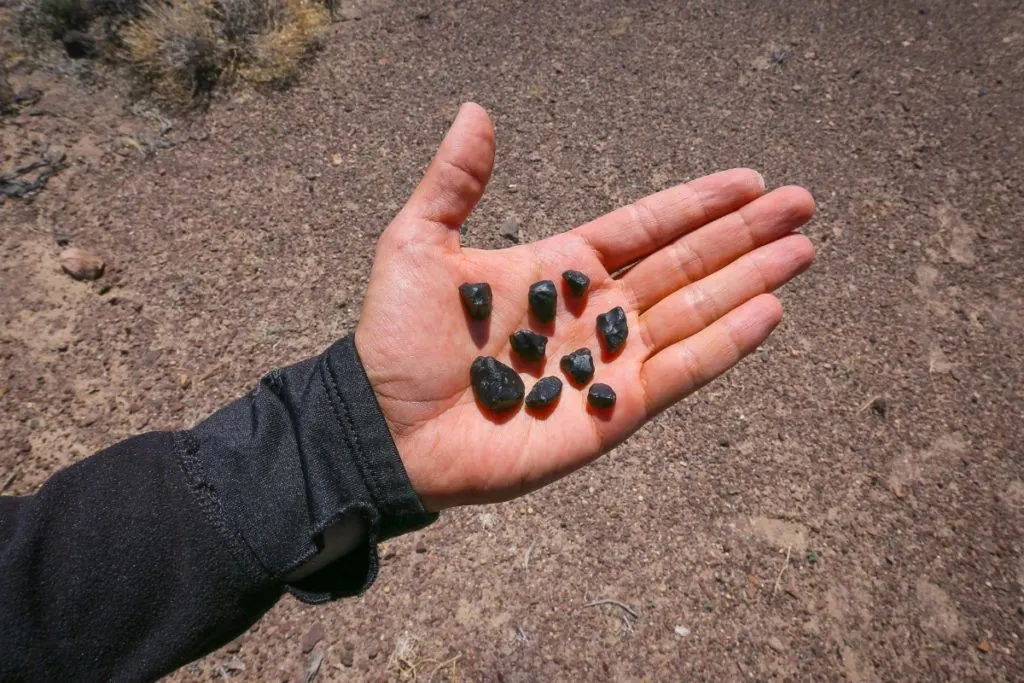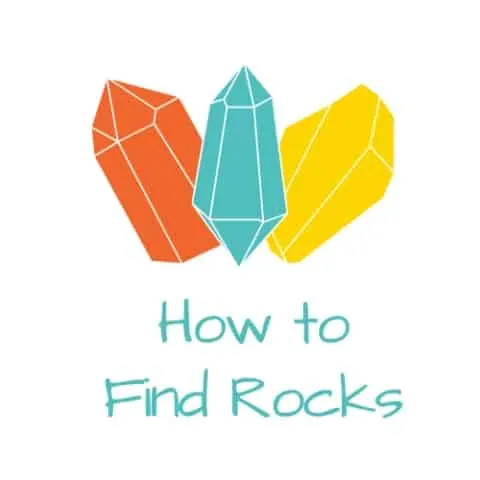As an Amazon Associate, I earn from qualifying purchases with no additional costs for you.
Obsidian is among the most prized rocks that all rockhounds want to have in their collections. This igneous rock isn’t always black, as its appearance depends mostly on the impurities present within. But where to find obsidian? What sites are generally the best, and where should you go in the United States?
Obsidian is mostly found where lava quickly cools due to sudden contact with air or water. When lava cools along the edges of a dike, obsidian forms intrusively. Some of the most famous places to find obsidian worldwide include the Eolie Islands, Italy, Mount Hekla, Iceland, Yellowstone National Park, and the U.S.
However, we will focus mostly on where to find obsidian in the U.S. Let’s discover where this beautiful igneous rock is commonly found and the best spots in the United States.

If you want to check out the best books about rock and mineral identification, you can find them here (Amazon link).
Where Can I Find Obsidian Near Me?
Living in the U.S. comes with some great advantages regarding rockhounding. This is especially true if you want to find obsidian, as the U.S. has many regions with a rich volcanic history.
The Western parts of the U.S. are the richest in obsidian as the regions contained more active or extinct volcanoes. If you live in this area, you can find obsidian in volcanic vents, mines, lakes and creeks, dunes, hills, and national parks. If there is any evidence of volcanic activity in the area, these are the best places to look for obsidian.
Volcanic Vents
Volcanic vents occur quite often and usually without explosive activity. When this event happens, a fissure is formed from which molten rock, gases, and hot lava erupt. It can be many miles long but a few feet wide.
Such volcanic fields will usually birth obsidian rocks that can be collected when they are safe. Inquire if such volcanic vents were ever-present in your area, and go on a little rockhounding adventure. You might be able to find obsidian with little effort.
TIP: When magma erupts from a volcano, it forms extrusive or volcanic rocks on the surface. Check out the common rocks you can find near volcanos in the article below:
Ten Most Common Types of Rocks You Can Find In Volcanoes
Mines & Mountainous Regions
Obsidian can occasionally be found in mines. Mines near volcanoes may contain obsidian specimens that you can collect. The volcanic glass was most likely buried under the earth over time, and all you have to do now is unearth it.
The mountainous regions of the western United States have a rich history of volcanism and are worth exploring for obsidian.
Lakes and Creeks
Because obsidian forms when lava rapidly cools, bodies of water are an excellent place to begin looking for this rock. The glass stone may have formed beneath the water or been carried away by a flood from the land.
This is why obsidian can be found in many lakes and creeks throughout the United States. However, such specimens are frequently tiny, better known as Apache Tears.
TIP: There are plenty of natural environments in which you can rockhound. Rivers and creeks are among the best ones. Check out cool tips on finding rocks in rivers and creeks in the article below:
8 Tips On Finding Gemstones In Nature (Rivers & Creeks)
Hills, Dunes & Canyons
Obsidians can appear in unexpected places, such as hills, dunes, or canyons. One of the reasons for this, aside from previous volcanic activity, is that it was carried there. Native Americans famously used obsidian to make tools like arrowheads.
Some of these objects can still be found today, particularly near areas where natives traded or hunted wild animals. A stray obsidian arrow is easy to find if you do some research on the area’s history.
National Parks
National Parks are famously known as the best spots where several rocks, minerals, fossils, or crystals are preserved. More often than not, collecting items in such regions is illegal, but if you want to experience the simple joy of finding obsidian without taking it home, this is where you should go.
Many National Parks in the U.S. are situated near volcanoes or have have experienced some form of volcanic activity. If all the other regions for finding obsidian don’t do you good, then your best bet would be to head towards a National Park.
TIP: Acquiring a piece of obsidian that needs to be cut and polished can be quite stressful if you have never done it before. Check out the complete guide in the article below:
How to Cut & Polish Obsidian: Follow These 7 Simple Steps
Where to Find Obsidian in the US? The Best Locations

As you can see, obsidian can be found almost anywhere in the United States, particularly in the western regions. It can be discovered by chance in the water, woods, mines, hills, near volcanic vents, creeks, and National Parks, or by exploring areas where natives used to hunt or trade.
Obsidian can be found in Yellowstone National Park’s Obsidian Cliff, the Warner Mountains, the San Francisco Volcanic Field, Glass Butte in Oregon, Big Southern Butte in Idaho, Cochetopa Dome, Massacre Lakes, Obsidian Ridge, and the Black Rock Desert, among other places.
Obsidian Cliff, Yellowstone National Park, Wyoming
The Yellowstone National Park in Wyoming is perhaps the most iconic location to find obsidian, especially at Obsidian Cliff. Yellowstone experienced several volcanic events, and the quick cooling of magma resulted in many obsidian formations.
The Obsidian Cliff isn’t the only sight worth seeing, as you can also witness many obsidian specimens at the Green River area or the Jackson Hole along the Teton Pass.
Wyoming is an exceptional state for rockhounding; however, if you find yourself at Yellowstone National Park, you know it is illegal to take anything.
TIP: Check out this article for a complete rockhounding guide in Wyoming.
Warner Mountains, Northern California
The Warner Mountains in Northern California experienced some volcanic activity in the past, leading to obsidian formation. Here, explorers won’t find just regular black obsidian but pink and rainbow obsidian as well due to its contents.
In the area of the Warner Mountains, there are four mines where collecting obsidian is permitted. You also have the chance to collect obsidian at the Modoc National Forest as well, which is nearby.
In some regions, you will need a permit to do so. As such, obtaining one with the local authorities is best.
TIP: Check out this article for a complete rockhounding guide in California.
San Francisco Volcanic Field, Arizona
The San Francisco Volcanic Field in Arizona, which covers more than 3,000 square miles and contains approximately 600 volcanic vents, is one of North America’s most impressive geological features.
The volcanic field extends across national parks and private lands. Although enthusiasts are permitted to collect obsidian, not all regions allow it.
This is why it is best to ask the authorities for permission ahead of time. This way, you’ll also know where to go directly.
TIP: Check out this article for a complete rockhounding guide in Arizona.
Cochetopa Dome, Colorado
Another exceptionally famous spot to find obsidian in the U.S. is the Cochetopa Dome in Colorado, about 20 miles south of Gunnison. It is the only place in Colorado where you will always find obsidian.
Also known as Chochetopa Hill, it is a region where native Americans gather and search for obsidian to this day to make their arrowheads for their annual hunts. Since many private owners bought various pieces of land, various regions are off-limits to visitors.
Lakes and creeks, on the other hand, are famous because they contain many small obsidian nuggets found during storms. Apache Tears are approximately ¼-2 inches in size. The traditional story behind Apache tears makes them so popular as collectible rocks.
It is claimed that the military caught the Apache tribe off guard with a surprise attack in the area in the 1870s. Many claim that the widows’ tears turned into pieces of obsidian after the slaughter.
The legend goes that anyone with an Apache Tear will never cry again because the widow’s tears will replace the stone owner’s.
TIP: For a complete rockhounding guide in Colorado, check out this article.
Black Rock Desert, Utah
Rockhounds can find obsidian in Millard County in western Utah in the famous Black Rock Desert. Here, you can find snowflakes and red, black, or brown obsidian. Many areas aren’t privately owned, so collectors can make their wishes come true.
In Piute County, which is very close, several obsidian sources exist. However, many parts of the land are privately owned, and permission is required to collect the beautiful obsidian specimens there.
TIP: Check out this article for a complete rockhounding guide in Utah.
Obsidian Ridge, New Mexico
One of the best places to find obsidian in New Mexico is the Obsidian Ridge. It lies along with the Jemez Volcanic field in the Jemez Mountains, about 50 miles northwest of Santa Fe.
There are many places where collectors can hunt for obsidian freely, but there are also restricted areas where permits are required.
TIP: Check out this article for a complete rockhounding guide in New Mexico.
BTW: Do you want to know more about rock and mineral identification? The books listed below are the best ones you can find on the internet (Amazon links):
- Smithsonian Handbooks: Rocks & Minerals
- Gemstone & Crystal Properties (Quick Study Home)
- Ultimate Explorer Field Guide: Rocks and Minerals (National Geographic Kids)
Conclusion
Obsidian can be found in various exciting locations throughout the United States. If you live in one of the western states, you’re lucky because obsidian is the most abundant. in those regions.
Wherever you search for obsidian, always bring the necessary tools because you never know what else you might find. Also, research the local laws to see if you need a permitions.
TIP: Obsidian is a valuable material with intriguing textures. It is widely used for tumbling, beads, and small sculptures. Find out more about obsidian value in the article below:
5 Crucial Factors of Obsidian Value: What’s Obsidian Worth?
